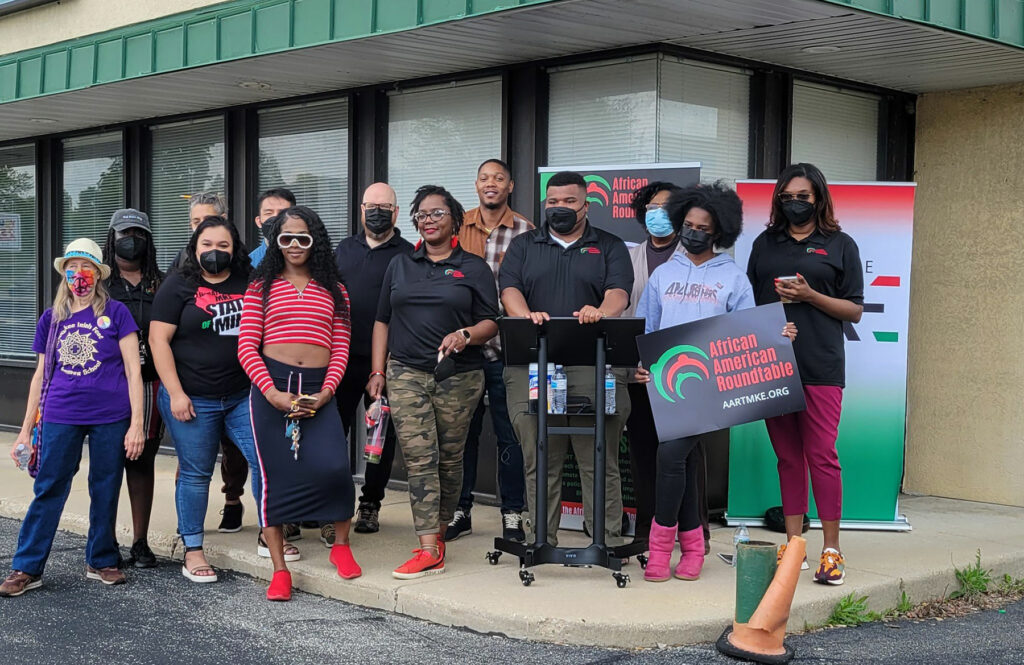Activists Urge Community Input on ARPA Spending
African American Roundtable, others urge city officials to listen to residents.

The African American Roundtable hosted a rally Thursday to call for more resident participation in how funds from the American Rescue Plan Act are allocated. Photo by PrincessSafiya Byers/NNS.
The African American Roundtable on Thursday called for residents’ participation in budgeting as the City of Milwaukee receives the second half of American Rescue Plan Act funding.
The second round of funding arrived Thursday as well, bringing the total the city has been allocated in American Rescue Plan Act funds to $394.2 million. The Common Council and then-Mayor Tom Barrett decided how to spend the first half.
Here is how the first set of funds were planned to be spent.
The arrival of the second installment of $197.1 million is prompting the African American Roundtable, which works to include and educate Milwaukee residents on the causes that affect them, to suggest other ways to use the sum.
The funds arrive as the city projects a $50 million increase in the annual pension payment starting next year as well as increased costs due to inflation and other factors.
“Mayor Cavalier Johnson is proposing to spend 80% of the second tranche of funding on revenue replacement, which would not expand community services,” a news release by the Roundtable said.
The Journal Sentinel reported on May 5 that, under a plan endorsed by the council’s Finance and Personnel Committee, $75 million of the second installment would be used to maintain service levels in 2023 with additional funding for services in 2024 left undetermined.
Angela Harris, an educator with Milwaukee Public Schools, said youths should be front and center when deciding how funds will be allocated.
“These funds could help create educational enrichment opportunities that prioritize and benefit young people,” Harris said. “We no longer should allow decisions to be made top-down, they need to be made bottom-up.”
Richard Diaz, the chairperson for the Coalition on Lead Emergency, focused on how funds could help with lead abatement efforts.
The city has 70,000 lead service lines, many of which are concentrated in the central city. Exposure to lead in water has been tied to health problems, including behavioral health, cognitive function and neurological effects in children.
“There are studies that show when a child tests at 6 micrograms for lead poisoning, they are 60 times more likely to commit a violent crime,” Diaz said. “It just so happens that the same neighborhoods that are more affected by lead poisoning are the same ones affected by joblessness, poverty and low education. If we truly hope to combat some of the issues in our city, we have to combat the lead poisoning crisis in children.”
And Markasa Tucker, the executive director of the African American Roundtable, also called for a different spending strategy.
Throughout the rally, members of the group discussed the way the city had invested in policing. The City of Milwaukee allocated about $280 million to the Milwaukee Police Department in its 2022 budget.
“We’ve seen residents ask for investment in public services that are needed in our communities,” said Devin Anderson, the membership and coalition manager for the African American Roundtable. “Instead of that investment, we’ve seen elected officials doubling and tripling down on investment into policing.”
Tucker pointed to Boston as a starting point for participatory budgeting.
“They allow young people ages 12-25 to participate in how to spend funds,” she said. “What is Milwaukee waiting for?”
What’s next?
You can find the full video of the Thursday event and keep up with what the Roundtable is doing on its Facebook page.
The Roundtable plans to continue discussions with city leadership on participatory budgeting.
“People are on our side,” said Anderson. “Just a year ago Milwaukee protested for a year straight, what have you done for a year straight?”
African American Roundtable calls for more resident participation in the spending of American Rescue Plan Act funds was originally published by the Milwaukee Neighborhood News Service.





















With record homocides and violence being the number 1 priority for most residents it seems that the vast majority of residents want these funds to be spent on policing and incacerating repeat violent criminals.